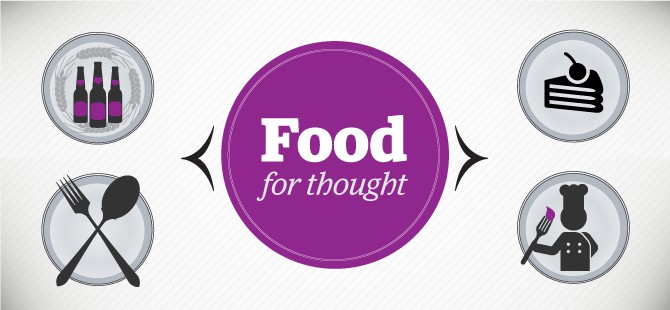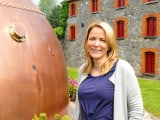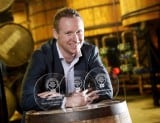The inside track on Ireland’s booming food and beverage industry.
THAT’S THE SPIRIT
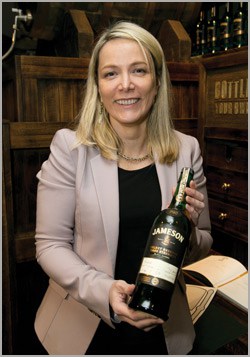
Anna Malmhake
Irish Distillers Pernod Ricard recorded an exceptional year of growth as the rejuvenation of Irish whiskey takes hold across the globe.
Financially, 2014/2015 proved to be another successful one for Irish Distillers Pernod Ricard. Jameson continues to spearhead the rejuvenation of Irish whiskey, with the brand reaching its 26th year of consecutive growth. In 53 markets, Jameson is experiencing double- and triple-digit growth.
Irish Distillers recently invested over €200m doubling production capacity in its Midleton Distillery in Cork and Fox & Geese bottling facility in Dublin, and expects to have to double capacity again in the coming years to meet global demand for its products.
The group continues to lead a growing resurgence in Irish whiskey through its iconic Jameson brand and its growing portfolio of premium single pot still Irish whiskeys. Innovation and sustainability are key focuses for new product development.
Commenting on the performance of Irish Distillers Pernod Ricard, Anna Malmhake, chairman and CEO said: “The sustained progress of Jameson within the Pernod Ricard family of brands has been one of the group’s most eminent success stories. Jameson is the number one-selling Irish whiskey in the world, an Irish export story we should be truly proud of.
“As one of Ireland’s thriving exports, Jameson is playing a key role in the export-led recovery of the Irish economy as we continue to embrace this progress by honouring our heritage while also delivering new and innovative expressions of Irish whiskey.”
As one of Ireland’s thriving exports, Jameson is playing a key role in the export-led recovery
Malmhake does warn, however, that in stark contrast to this growth and optimism for export markets, the outlook for the industry here in Ireland is concerning. “The penal excise increases on alcohol accumulated since 2013 endanger the export success of indigenous products such as Irish whiskey as well as the 92,000 jobs being supported by the drinks industry in every county throughout Ireland,” she said.
Malmhake also pointed out that Ireland is one of the most expensive places in the world to buy Irish whiskey. “We regularly receive queries from visitors wondering why it’s so expensive to buy Jameson here. One has to ask how sustainable is the current international growth of Irish whiskey without a solid local market in which to support home-grown brands as well as new market entrants.
“The price of alcohol in Ireland is now the highest in the EU at 178% of the EU average (Eurostat). However, this has only served to damage the industry and increase costs for responsible drinkers, doing little to address misuse. The industry is acutely aware of the need to act on Ireland’s complex societal relationship with alcohol; however, I would urge the government to first of all reverse the excise increase from Budget 2014 in order to ensure the future commercial viability of drinks-related enterprises in Ireland and, secondly, seek to tackle the serious issue of alcohol misuse with targeted measures such as addressing deeply discounted alcohol prices and employing evidence-based solutions.
“A reduction in excise would give welcome relief to both hard-working Irish consumers and the tourist trade visiting our country, while also stimulating the growth of an industry which has huge opportunity for job creation.”
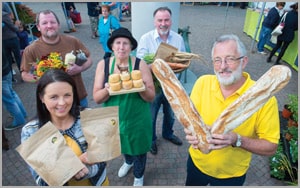 THE ART OF ENTERPRISE
THE ART OF ENTERPRISE
A unique Artisan Food Enterprise and Innovation Strategy 2015-2020 was announced recently by South and East Cork Area Development (SECAD). The report outlines a comprehensive strategy to support the significant artisan food and processing sector and further develop the industry in rural Cork.
“Through research, engagement with food enterprises and benchmarking activities, the report has developed a vision and pathway for the artisan food sector in Cork that will create more jobs, promote and develop the sector sustainably and ensure that the region is fully equipped to capitalise on the opportunity to build high-quality artisan food companies in this region,” Ryan Howard, CEO of SECAD said.
The artisan food and processing sector in south and east Cork makes a significant contribution to the social and economic fabric of the region, and now has over 100 active food processors, ranging from start-ups to micro enterprises and established SMEs.
The strategy was announced in the run-up to the Midleton Food Festival on September 12.
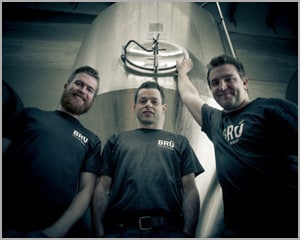 AWARD-WINNING CRAFTY BUSINESS
AWARD-WINNING CRAFTY BUSINESS
Brú Brewery, from Trim in Co Meath, has won three awards at the 2015 World Beer Awards including a Gold Medal for its Gluten-Free Lager. It has also won a silver medal for its Irish Red Ale, and a bronze medal for its Irish Craft IPA.
The World Beer Awards is the most prestigious competition for beer globally, and recognises the world’s best beers.
Brú Brewery was founded in 2012 by Daire Harlin and Paddy Hurley, and has grown from strength to strength.
“We are delighted with this recognition for our brewery and our craft beers. Awards in three categories, including a gold medal, reflects the passion and dedication of the team to brewing the finest quality hand-crafted beer using locally sourced ingredients,” brewer Paddy Hurley said.
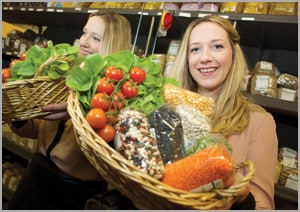 DUTCH COURAGE
DUTCH COURAGE
Cork vegan food company Dee’s Wholefoods is bringing its range of burgers, sausages and convenient ready meals to the Netherlands.
The Irish company has secured a lucrative deal with Jumbo, one of the largest players in the Dutch groceries sector. The rapidly expanding retail group now commands almost a quarter (24.8%) of the Dutch grocery market, and the deal will bring Dee’s Wholefood products to almost 600 stores across the country.
The Netherlands is one of the EU’s largest and most prosperous economies, and Dutch consumers spend approximately €57bn on food products annually, making it one of the world’s key markets for food products.
Taking her first steps into the mainland European market, the company’s founder Deirdre Collins said: “This is a huge and very exciting step forward for the business and will allow us to create three new jobs here in Cork. The Netherlands is one of the most mature, yet vibrant and dynamic markets in the world and it is fantastic to be able to bring our products to Dutch consumers.”
Globally, the market for meat-free food continues to grow and recent studies have estimated that the vegan and vegetarian market was worth €921m in 2014; 12% of UK adults and one in five of those aged 16-24 follow a vegetarian or vegan diet. Across the European Union, most countries are showing similar trends, with a growing market share for meat-free alternatives as consumers embrace healthier options.
T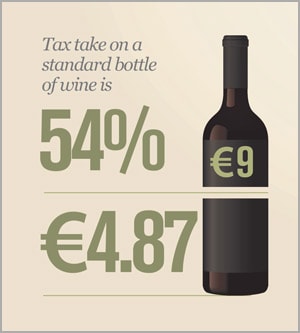 HE GRAPE DEPRESSION
HE GRAPE DEPRESSION
The Irish Wine Association has released its annual Irish Wine Market review, which called on the Government to reverse excise on alcohol in the next Budget. There has been a 62% increase in excise since 2012 and the report states that the increase in excise has a detrimental effect on the cashflow of wine distributors and importers. The total excise payable to revenue is €14,640 higher per 1,000 cases of wine than it was in 2012. This, the industry says, has put jobs at risk and has made it impossible to scale up and take on new talent.
Tax take on a standard bottle of wine is now over 50%. Irish wine excise is the highest in the EU, and 14 countries pay no excise on wine. Excise on wine is now 106 times higher in Ireland than France. Spanish tourists pay almost twice the price for wine in Irish restaurants than they do at home.
Michael Foley, chairman of the Irish Wine Association and marketing director at Findlater Wine & Spirits said: “Excise is the number one threat to the Irish wine industry. Draconian excise hikes have meant that since 2011 the tax take from a standard e9 bottle of wine has increased from 39% to 54%. This impacts on the cashflow of Irish wine importers and distributors, as many have to pay excise as an up-front cost. The vast majority of these jobs are in small, family-operated businesses across Ireland, making it difficult to take on new talent. The message coming from the industry is clear: reverse excise increases and support thousands of small businesses and jobs across the industry.”
Evelyn Jones, government affairs director of the National Off-Licence Association, who are part of the Support Your Local campaign, said: “The Support Your Local campaign is calling for excise tax on alcohol to be cut, stating that these taxes are damaging competitiveness and costing jobs. Today’s report confirms that excise is preventing SMEs from investing in their businesses due to cashflow constraints.”
